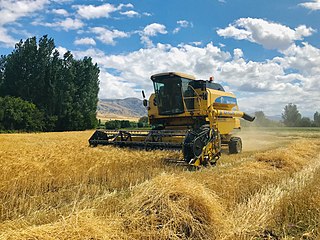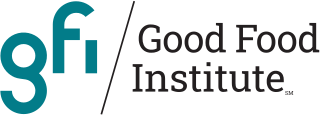
Food is any substance consumed by an organism for nutritional support. Food is usually of plant, animal, or fungal origin and contains essential nutrients such as carbohydrates, fats, proteins, vitamins, or minerals. The substance is ingested by an organism and assimilated by the organism's cells to provide energy, maintain life, or stimulate growth. Different species of animals have different feeding behaviours that satisfy the needs of their metabolisms and have evolved to fill a specific ecological niche within specific geographical contexts.
Kashrut is a set of dietary laws dealing with the foods that Jewish people are permitted to eat and how those foods must be prepared according to Jewish law. Food that may be consumed is deemed kosher, from the Ashkenazi pronunciation of the term that in Sephardic or Modern Hebrew is pronounced kashér, meaning "fit". Food that may not be consumed, however, is deemed treif, also spelled treyf.

Veganism is the practice of abstaining from the use of animal products—particularly in diet—and an associated philosophy that rejects the commodity status of animals. A person who follows the diet or philosophy is known as a vegan.

Animal husbandry is the branch of agriculture concerned with animals that are raised for meat, fibre, milk, or other products. It includes day-to-day care, management, production, nutrition, selective breeding, and the raising of livestock. Husbandry has a long history, starting with the Neolithic Revolution when animals were first domesticated, from around 13,000 BC onwards, predating farming of the first crops. By the time of early civilisations such as ancient Egypt, cattle, sheep, goats, and pigs were being raised on farms.

The Agricultural Research Service (ARS) is the principal in-house research agency of the United States Department of Agriculture (USDA). ARS is one of four agencies in USDA's Research, Education and Economics mission area. ARS is charged with extending the nation's scientific knowledge and solving agricultural problems through its four national program areas: nutrition, food safety and quality; animal production and protection; natural resources and sustainable agricultural systems; and crop production and protection. ARS research focuses on solving problems affecting Americans every day. The ARS Headquarters is located in the Jamie L. Whitten Building on Independence Avenue in Washington, D.C., and the headquarters staff is located at the George Washington Carver Center (GWCC) in Beltsville, Maryland. For 2018, its budget was $1.2 billion.

Cultured meat, also known as cultivated meat among other names, is a form of cellular agriculture where meat is produced by culturing animal cells in vitro. Cultured meat is produced using tissue engineering techniques pioneered in regenerative medicine. Jason Matheny popularized the concept in the early 2000s after he co-authored a paper on cultured meat production and created New Harvest, the world's first non-profit organization dedicated to in-vitro meat research. Cultured meat has the potential to address the environmental impact of meat production, animal welfare, food security and human health, in addition to its potential mitigation of climate change.

Conversations regarding the ethics of eating meat are focused on whether or not it is moral to eat non-human animals. Ultimately, this is a debate that has been ongoing for millennia, and it remains one of the most prominent topics in food ethics.
In animal husbandry, feed conversion ratio (FCR) or feed conversion rate is a ratio or rate measuring of the efficiency with which the bodies of livestock convert animal feed into the desired output. For dairy cows, for example, the output is milk, whereas in animals raised for meat the output is the flesh, that is, the body mass gained by the animal, represented either in the final mass of the animal or the mass of the dressed output. FCR is the mass of the input divided by the output. In some sectors, feed efficiency, which is the output divided by the input, is used. These concepts are also closely related to efficiency of conversion of ingested foods (ECI).

Agriculture is still an important sector of Turkey's economy, and the country is one of the world's top ten agricultural producers. Wheat, sugar beet, milk, poultry, cotton, vegetables and fruit are major products; and Turkey is the world's largest grower of hazelnuts, apricots, and oregano.
New Harvest is a donor-funded research institute dedicated to the field of cellular agriculture, focusing on advances in scientific research efforts surrounding cultured animal products. Its research aims to resolve growing environmental and ethical concerns associated with industrial livestock production.
Philip John Lymbery is the Global CEO of farm animal welfare charity, Compassion in World Farming International, Visiting Professor at the University of Winchester’s Centre for Animal Welfare, President of Eurogroup for Animals, Brussels, founding Board member of the World Federation for Animals and a Leadership Fellow at St George's House, Windsor Castle.
Karen Beauchemin is a federal scientist in Canada who is recognized as an international authority on methane emissions and ruminant nutrition. Her research helps develop farming techniques that improve how we raise cattle for meat and milk, while reducing the environmental impacts of livestock production.
This page is a timeline of major events in the history of cellular agriculture. Cellular agriculture refers to the development of agricultural products - especially animal products - from cell cultures rather than the bodies of living organisms. This includes in vitro or cultured meat, as well as cultured dairy, eggs, leather, gelatin, and silk. In recent years a number of cellular animal agriculture companies and non-profits have emerged due to technological advances and increasing concern over the animal welfare and rights, environmental, and public health problems associated with conventional animal agriculture.

The Good Food Institute (GFI) is a 501(c)(3) nonprofit organization that promotes plant- and cell-based alternatives to animal products, particularly meat, dairy, and eggs. It was created in 2016 by the nonprofit organization Mercy For Animals with Bruce Friedrich as the chief executive officer. GFI has more than 150 staff across six affiliates in the United States, India, Israel, Brazil, Asia Pacific, and Europe. GFI was one of Animal Charity Evaluators' four "top charities" of 2022.

Goat farming involves the raising and breeding of domestic goats as a branch of animal husbandry. People farm goats principally for their meat, milk, fibre and skins.
Cellular agriculture focuses on the production of agricultural products from cell cultures using a combination of biotechnology, tissue engineering, molecular biology, and synthetic biology to create and design new methods of producing proteins, fats, and tissues that would otherwise come from traditional agriculture. Most of the industry is focused on animal products such as meat, milk, and eggs, produced in cell culture rather than raising and slaughtering farmed livestock which is associated with substantial global problems of detrimental environmental impacts, animal welfare, food security and human health. Cellular agriculture is a field of the biobased economy. The most well known cellular agriculture concept is cultured meat.

Cellular Agriculture Society is a lobby organization. It is an international 501(c)(3) organization based in Miami, created in 2017 to research, fund and advance cellular agriculture.
Aleph Farms is a cellular agriculture company active in the food technology space. It was co-founded in 2017 by the Israeli food-tech incubator "The Kitchen Hub" of Strauss Group Ltd., and Prof. Shulamit Levenberg of the Faculty of Biomedical Engineering at Technion – Israel Institute of Technology and is headquartered in Rehovot, Israel.

Perfect Day, Inc. is a food technology startup company based in Berkeley, California, that has developed processes of creating dairy proteins, including casein and whey, by fermentation in microbiota, specifically from fungi in bioreactors, instead of extraction from bovine milk.
Vow is an Australian company that plans to grow cultured meat for commercial distribution.










